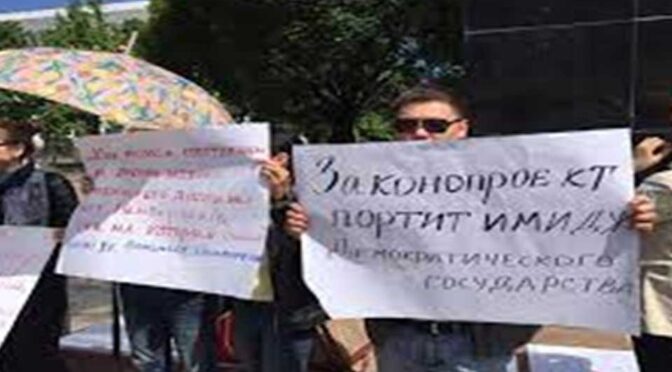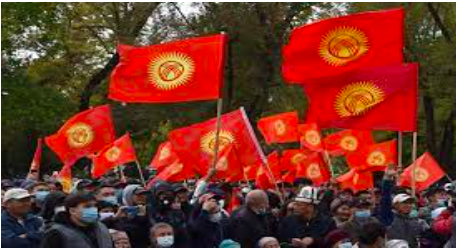New NGO Legislation in Kyrgyzstan
Posted on : August 9, 2021Author : Nazia Jafri

The celebration of this year’s Kyrgyz Independence Day was coupled with paradox about the freedom of the civil society in the nation. Within the country there is a debate about the policies and laws that the new President is implementing in the nation. Late in June this year, President Sadyr Japarov passed a law that puts certain amount of restrictions on the freedom of the civil society and impedes the work of Non-Governmental Organizations (NGO). The civil society views this as a deliberate attempt to hamper its progress towards corruption and inculcate fear among the independent activists. The Kyrgyz government already burdened the NGO’s by making it necessary to provide a detail of their activities and report about the finances but this law takes a step forward.
Throughout the uprisings of 1990’s and 20’s Kyrgyzstan has managed to pull an image of the most democratic country in the entire Central Asian region but with this law there is a certain hindrance towards that way. There is a growing concern amongst Human Right organisations as well for this law and both International Partnership for Human Rights (IPHR) and the Coalition against Torture in Kyrgyzstan asked the governing authorities to reconsider this to ensure that this law does not impede the progress of NGOs within the nation.
The Kyrgyz government is using the pretext of monetary transparency and now the NGOs are required to submit yearly report on their source and expenditure of funds which includes another multiple level of details in between. The point to note here is that the procedures are very unclear and are fully in control of the governing authorities but consequences are made very much obvious. Those NGO’s that fail to follow these rules will suffer from penalties including a forceful shut down.
IPHR explains that this law, “requires NGOs, which carry out their work on the basis of grants and donations, to annually prepare and submit a report about their sources of funding, the expenditure of these funds, and their acquisition and use of property for publication on the website of the state tax service.” Throughout the law there is ample space for misuse of that can’t be ignored. IPHR hints at certain hidden concerns that could be related to this law as the country already had laws regarding the finances of NGOs. Also the execution of law is quite uncertain and indicates only selective implementation. The sourcing of funds could be a potential point for the forced closure of many NGOs as there has been concern about Western funding.
Throughout the country this legislation received criticism for the approval and its biased implementation. From civil society to international community, there was harsh disapproval of the law but regardless of the fact the law came into force. Human rights associations are anxious about the adverse impact of the law on civil society units.
Sadar Japarov has been justifying this amendment under the name of transparency for NGOs. But since there is previously enough laws and rules for NGOs to provide detailed account of its financial status to the government this comes as an additional liability with ulterior motives. The NGOs already have to report their finances to state fiscal service, social fund, and the statistics committee. Under the existing laws the authorities also supervise the finances from time to time through tax audits and other ways. Many NGOs are just small scale organisations in the region and this new law will contribute to their woes with meagre employees and assets.
Also this law is precisely enforced to organisations registered as NGOs only. The law does not provide any explanation as why only these associations are picked for additional explanation of finances while leaving out other non-profit institutions such as commercial or political institutions. The law clearly points that this additional financial report is not required for non-commercial establishments that are associated with state or civic bodies. There is a clear depiction of a biased view under the law.
Critiques from the international community are also pointing out that this law might make those NGOs vulnerable that are mostly working against corruption and human rights issues in the region. Activists and NGOs that favour the fundamental rights and freedom of people can come directly under the scrutiny through this law. Moreover Sadyr Japarov in his April referendum passed a provision on “traditional values” without even clearly defining the concept. NGOs working on such issues have repeatedly been apprehensive over this as it may lead to unjust constraints on freedom of expression and other fundamental freedoms in the region. To avoid criticism media organisations are also not spared and have been encouraged to glorify the country internationally. Previously under the name of traditional values many NGOs in the region have been termed as propagators of western interests and a threat to national security due to their work on human rights violations and the depiction of the related issues in the country.
The establishment of NGOs began in Kyrgyzstan during the early 1990s but they entered in political arena by 20s. In 2004 a concept of cooperation came into being between governing authorities and NGOs. However, this concept was vague and did not cover finances. The joint unit worked in fields of consultation, information sharing, and addressing social issues. The authorities have been trying to limit their participation from time and again, mostly on superficial level. The NGOs eventually gained political weight after 2010 due to their role in stabilizing situation during the uprisings. The NGO sector has been active and working on various issues including politics since then. Kyrgyz NGOs have come a long way since their initiation. Apart from the active role in politics they lead to a responsible civil society and work on numerous social service issues. With this law will there be a hindrance towards their working or not only time will tell. As of now the law has been passed and the NGOs will have to follow.
Source:
International Partnership for Human Rights (IPHR), https://www.iphronline.org/civicus-kyrgyzstan-jan-apr-2021.html
Civil society development in Central Asia by M. H. Ruffin and D. C. Waugh, 2011.
The Development of Civil Society in Central Asia by J. Giffen, L. Earle and C. Buxton, 2005.
NGOs in Kyrgyzstan: Yesterday, Today, Tomorrow by A. Musabaeva, 2011.
Civil society and politics in Central Asia by Charles E. Ziegler, 2015
Where are all our sheep? Kyrgyzstan, a global political arena by B. Petric, 2015.
Eurasianet: https://eurasianet.org/kyrgyzstan-tightens-control-over-ngos-taps-anti-western-sentiment
24kg: https://24.kg/english/200199_President_of_Kyrgyzstan_signs_law_on_financial_reporting_by_NGOs_____/
Nazia Jafri
Adjunct, Asia in Global Affairs




